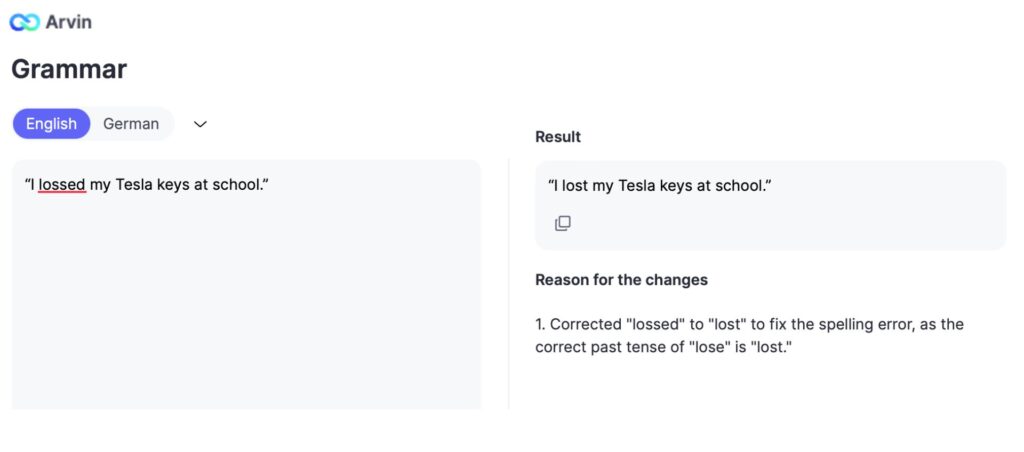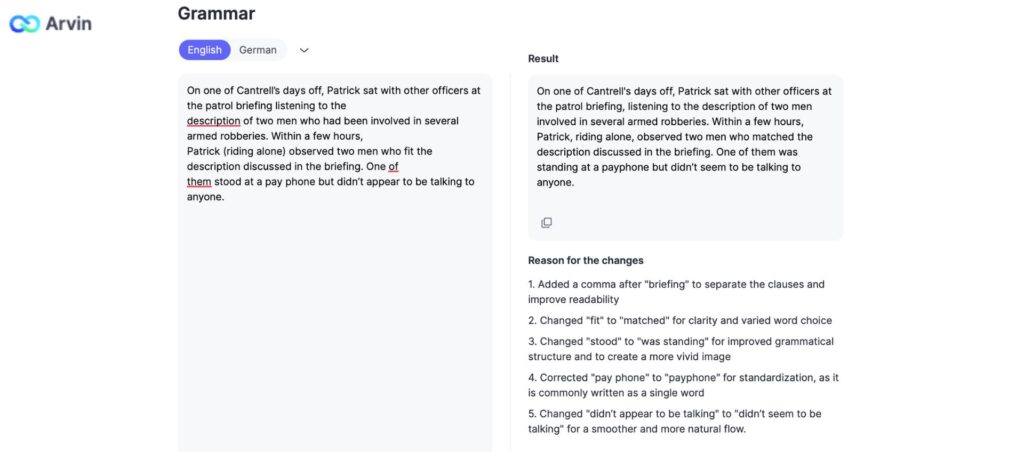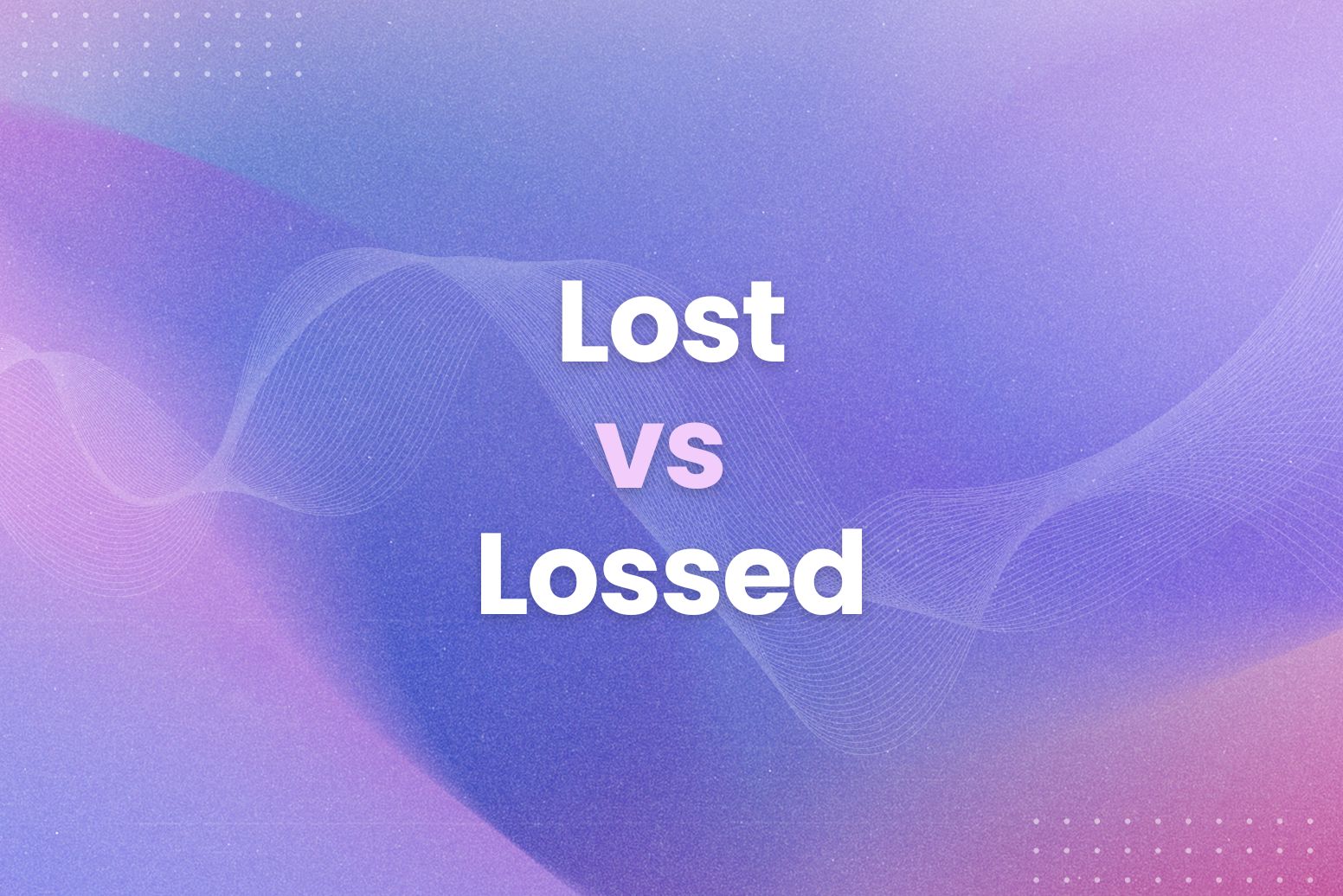Let’s face it, the English language can be super confusing. For instance, people often toss around words like lost, loss, and the completely incorrect lossed, which causes plenty of mix-ups. Therefore, let’s clarify things by breaking down one of the most common questions people ask: is it “lost vs lossed”?
Moreover, we’ll explain how to use lost and loss properly and, most importantly, why you should completely avoid using lossed. Arvin AI’s free Grammar Checker helps you avoid embarrassing mistakes by combining writing and checking into a single platform.
What Does Lost Mean?
Lost is a word that has a few different meanings and uses, and it’s pretty common in everyday conversation.
You Can Use Lost as a Verb:
It serves as the past tense of lose, meaning someone misplaced something, had it taken away, or failed to win.
Example: “She lost her AirPods while walking home; as a result, she had to borrow her friend’s earbuds, which was quite inconvenient for her.”
Or As an Adjective:
It describes a state of being confused, unsure, or not knowing where you are. Furthermore, it can also mean feeling emotionally defeated or disconnected, which adds even more depth to its meaning in personal contexts.
Example: “After the big move to Singapore, he felt totally lost in the new city and its culture.”
What Does Lossed Mean?
Lossed isn’t actually a real word; however, it sometimes gets used by mistake. In fact, many people assume it’s the past tense of “loss,” yet that’s not correct. Instead, by understanding the proper use of “lost” and “loss,” you can easily avoid this common error.
Why is “Lossed” Incorrect:
- “Loss” is a noun, and nouns don’t have past-tense forms like verbs do. The word you’re looking for is probably lost, which is the correct past tense of “lose.”
How to Avoid Using “Lossed”:
There’s no such thing as lossed, so, for that reason, it’s best to just forget it exists!
If you’re talking about something misplaced or someone being defeated, use lost.
- Incorrect: “I lossed my Tesla keys at school.”
- Correct: “I lost my Tesla keys at school.”

Try out our free grammar checker and evaluate your work!
If you’re talking about the state of losing something, use loss as a noun.
- Incorrect: “She felt a huge lossed after the breakup with her husband of 9 years.”
- Correct: “She felt a huge loss after the breakup with her husband of 9 years.”
What Is the Past Tense for “Lost”?
The past tense of “lost” is simply lost itself, mainly because it is already the past form of the verb lose.
- “I lose my keys every week.” (present)
- “I lost my keys yesterday.” (past)
Key Differences Between Lost vs Lossed
| Aspect | Lost | Lossed |
| Definition | The past tense of “lose,” meaning to misplace something or fail to win. | Not a valid word in English. It’s often mistakenly used for “lost” or “loss.” |
| Part of Speech | Verb or adjective. | None, as it is incorrect. |
| Usage | Correctly used to describe past actions or states. | Should not be used in any context. |
| Examples | “I lost my iPhone.” (verb) “I feel lost without my best friend, I can’t wait to see her again in the spring!” (adjective) | Incorrect: “She lossed her wallet at the park.” |
| Confusion Source | Similarity to “loss” (noun). | Mistaken attempt to create a past tense for “loss.” |
What is the Difference Between Lose, Loss, and Lost?
Lose:
Use this for present or future-tense actions.
- Example: “If you don’t study, you’ll lose the spelling bee competition.”
Loss:
Use this to describe the result or state of losing something.
- Example: “The loss of their basketball championship title was devastating, particularly since they trained for it for so long.”
Lost:
Use this for past actions (verb) or to describe confusion or misplaced (adjective).
- Verb: “I lost the keys to the house yesterday.”
- Adjective: “After the big move to Portugal, she felt completely lost as she was unable to speak Portuguese.”
Key Differences Between Lose, Loss, and Lost
Lose = Action.
Loss = Result.
Lost = Past action or condition.
| Aspect | Lose | Loss | Lost |
| Part of Speech | Verb (base form). | Noun. | Verb (past tense of lose) or adjective. |
| Definition | To misplace, fail, or not win. | The act or state of losing something. | Past action of losing (verb) or state of being unable to find something (adjective). |
| Usage | Describes an action happening now or in the future. | Describes a result or event. | Describes a completed action or current condition. |
| Examples | “Don’t lose your phone again!” | “The loss of her dog made her sad.” | “I lost my wallet yesterday.” (verb) “He feels lost without directions.” (adjective) |
What Is the Difference Between “Lost” vs “Have Lost”?
| Aspect | Lost | Have Lost |
| Definition | The past tense of “lose,” refers to something misplaced, taken away, or a situation in the past. | The present perfect form of “lose,” refers to a past action with a result or relevance to the present. |
| Tense | Simple Past: Focuses on completed actions in the past. | Present Perfect: Focuses on past actions that impact the present moment. |
| Focus | Emphasizes when the action happened. | Emphasizes the result of the action or its connection to the present. |
| Usage | Used for actions that happened and are finished. | Used when the past action has ongoing relevance or consequences now. |
| Time Reference | Often paired with specific time indicators like yesterday, last week, in 2020. | Often paired with words like already, just, never, so far, or yet. |
| Examples | “I lost my wallet yesterday, but I found it later.” | “I have lost my wallet, so I can’t pay for anything now.” |
Why Is Lossed Confusing?
One reason people mistakenly use lossed is that it sounds so similar to lost. In fact, in “Lost vs lossed,” the word lossed often trips people up because it feels like it should exist; however, it doesn’t.
How to Avoid the Confusion Between “Lossed” and “Lost”
Use loss for the result or state of losing something.
- Example: “The Wildcats in High School Musical faced a heartbreaking loss.”
Use lost for the action or past tense of lose.
- Example: “I lost my charger, and now I feel as powerless as Iron Man without his suit.”
Common Grammar Mistakes with Lost and Loss
Using “Loss” Instead of “Lost”
Error: “I felt a loss in the middle of the mall and couldn’t find my way out.”
Why It’s Wrong: “Loss” is a noun, so it can’t describe feeling confused or disoriented.
Correct: “It’s like being lost in the maze in The Maze Runner—you have no clue where you’re going.”
Using “Lost” Instead of “Loss”
Error: “The basketball team had a terrible lost in the finals last night.”
Why It’s Wrong: “Lost” is either an adjective or a verb. However, in this case, you need a noun to describe the result of losing.
Correct: “It was a crushing loss when Iron Man died in Avengers: Endgame—everyone felt it.”
Inventing the Word “Lossed”
Error: “She lossed her headphones at the concert.”
Why It’s Wrong: In “lost vs lossed”, “lossed” isn’t a word. The correct word is “lost.”
Correct: “Like Eleven losing her powers in Stranger Things—it’s gone, no coming back.”
Misusing “Lost” to Describe Death
Error: “I lost my dog last year, and it still hurts.”
Why It’s Confusing: While this sentence works, it can be unclear. In situations involving emotional or permanent events like death, the word “loss” is a better choice.
Better Option: “It was truly a loss for the ages when Mufasa died in The Lion King—without a doubt, nobody was okay.”
Using “Loss” for an Action
Error: “Don’t loss your AirPods again!”
Why It’s Wrong: “Loss” is a noun, but you need the verb “lose” here.
Correct: “Don’t lose your AirPods again!”
Lost vs Lossed Reddit: What Reddit Users Say
“Lossed” Isn’t a Real Word:
Reddit users frequently clarify that lossed doesn’t exist in the English language. It’s an incorrect attempt to create a past tense for “loss,” but “loss” is a noun and doesn’t need a past tense.
Mistaking “Lossed” for “Lost”:
Some Reddit posts also point out that people accidentally use “lossed” when they mean lost, which is the correct past tense of “lose.”
Example: “Someone on r/relationship_advice said ‘I lossed her trust,’ and I had to comment: ‘Dude, it’s lost, not lossed.’”
Why the Confusion Happens:
Many Redditors suggest that the confusion stems from the similarity between loss (a noun) and lost (a verb or adjective).
Example: “People think loss works like miss/missed, so they say lossed. It’s like thinking Kylo Ren is a Jedi—totally wrong.”

If the grammar checker is not your thing, check out our Writing Improver or even our AI Image Generator!
How to Remember the Difference Between “Lost” vs “Lossed” vs “Loss”
Lost: Use it for actions that happened in the past.
- Reddit Example: “I lost my wallet at Comic-Con and had to cancel my credit cards.”
Loss: Use it to describe the state or result of losing something.
- Reddit Example: “Their loss in the finals felt worse than a Stranger Things season cliffhanger.”
Lossed: Avoid it entirely!
Do We Use “Lost” or “Loss” in Death?
Talking about death is always tough, and choosing the right word—lost or loss—can make a big difference in how you express yourself. Both can work, but it depends on the context.
Use “Loss” to Describe the Event or Its Impact
Loss is a noun, so you use it to talk about the emotional weight or result of someone passing away. It’s more formal and reflects the big-picture impact.
- Example:
- “The loss of Paul Walker was heartbreaking for Fast & Furious fans everywhere.”
- In Black Panther: Wakanda Forever, the loss of T’Challa (and Chadwick Boseman in real life) is a central theme. Shuri’s grief shows just how deeply loss can shape someone’s journey.
Use “Lost” for the Action of Someone Passing Away
Lost is the past tense of “lose,” and it’s used to talk about the action or time of someone passing away. It feels more personal, like reflecting on an individual connection.
- Example:
- “In Stranger Things, Max lost her brother Billy in Season 3, and you can feel how it’s still affecting her in the next season.”
- In The Fault in Our Stars, Hazel talks about losing Augustus, and the way she describes it is raw and personal.
| Term | When to Use | Example |
| Loss | To describe the emotional result or event. | “The loss of Carrie Fisher left a huge void in the Star Wars fandom.” |
| Lost | To describe the action of someone passing. | “We lost Chadwick Boseman, and his legacy will always be remembered.” |
Loss or Lost in a Game: Which One to Use?
Use “Loss” to Describe the Result
Loss is a noun, so it refers to the event or outcome of losing the game. It’s usually used when talking about stats, records, or the overall result.
- Example:
- “The Wildcats’ loss in the championship was a tough one to swallow.”
- In Ted Lasso, Richmond’s loss to West Ham in Season 3 wasn’t just a game—it was a pivotal moment for the team’s growth.
Use “Lost” to Describe the Action
Lost is the past tense of “lose,” so it’s used to describe the action or moment when the game was lost. It focuses more on what happened during the event.
- Example:
- “The Wildcats lost the championship after their star player fouled out.”
- In Friday Night Lights, the Dillon Panthers lost games before, but every defeat taught them how to fight harder for the state title.
Key Differences Between Loss or Lost
| Term | When to Use | Example |
| Loss | To describe the result or outcome of a game. | “The Lakers’ loss to the Celtics knocked them out of the playoffs.” |
| Lost | To describe the action of being defeated. | “The Lakers lost the game because of poor defense.” |
Lost vs. Lossed: Grammar and Usage
Elevate your writing with our free AI grammar checker. Effortlessly catch grammar, spelling, and punctuation errors, ensuring your content is polished and error-free.
Is “Lossed” a Word?
No, lossed is not a valid word in English. It is a common mistake when people confuse the noun loss with the past tense of the verb lose, which is lost.
What Does “Lost” Mean?
Lost is the correct past tense and past participle of the verb lose. It is used to describe:
An Action: When something has been misplaced, missed, or defeated.
- “I lost my dog yesterday.”
A State: When someone feels disoriented, confused, or directionless.
- “I felt lost after moving to a new school in Cancun.”
Common Grammar Mistakes Between Lost vs Lossed
Using “Lossed” Instead of “Lost”
- Mistake: “He lossed his wallet at the concert.”
- Why It’s Wrong: “Lossed” is not a word; the correct past tense of “lose” is “lost.”
- Correct:
- “He lost his wallet at the concert.”
- It’s like saying “Spider-Man lossed his powers in Spider-Man 2”—nope, it’s “Spider-Man lost his powers.”
Using “Lossed” Instead of “Loss”
- Mistake: “The team suffered a tough lossed in the finals.”
- Why It’s Wrong: “Loss” is a noun; “lossed” isn’t valid in any context.
- Correct:
- “The team suffered a tough loss in the finals.”
- Think of the Quidditch World Cup in Harry Potter. Ireland didn’t suffer a “lossed”; they suffered a loss to Viktor Krum’s team.
Lost vs. Lossed Examples
“Lossed” does not exist! Do not use it.
Lost Examples
“In 2020, Donald Trump lost the U.S. presidential election to Joe Biden, which sparked numerous debates about election integrity.”
- Why It’s Correct: “Lost” is the past tense of “lose,” referring to the action of not winning the election.
“Taylor Swift lost the 2021 Album of the Year Grammy to Billie Eilish, but later won it in 2022 for Folklore.”
- Why It’s Correct: “Lost” describes a past event, specifically the moment Taylor didn’t win in one year.
Loss Examples
“The loss of Ruth Bader Ginsburg in 2020 marked the end of an era for the Supreme Court.”
- Why It’s Correct: “Loss” is a noun describing the event of Ginsburg’s passing and its impact.
“The music world mourned the loss of Whitney Houston, a pop icon who inspired countless artists.”
- Why It’s Correct: “Loss” describes the emotional and cultural impact of Whitney Houston’s passing.
“The loss of Game of Thrones’ quality in its final season disappointed millions of fans.”
- Why It’s Correct: “Loss” describes the decline in storytelling, which impacted the show’s reputation.
What Is the Past Tense of Lose?
The past tense of lose is lost.
Examples in Sentences
- “I lost my keys yesterday and had to call a locksmith.”
- “The team lost the game by one point.”
- “Taylor Swift lost the Grammy in 2014, but she came back stronger with 1989.”
- “The candidate lost the election after a controversial campaign.”
Do We Use “Loss” or “Lose” Weight?
Use “Lose” for the Action
Lose is a verb, used to describe the process of reducing weight. In pop culture, this is frequently tied to methods like fitness regimens, diets, or substances like Ozempic.
Ozempic, a drug originally designed for diabetes management, has become a trending solution for those trying to lose weight, as seen in its use by influencers and celebrities.
- Example: “Celebrities often aim to lose weight quickly for red-carpet events, like Kim Kardashian reportedly did for the Met Gala.”
Use “Loss” for the Result
Loss is a noun and refers to the outcome or state of having reduced weight. It focuses more on the end result rather than the process.
In Netflix’s The Substance, Demi Moore’s character pursues beauty and youth through a mysterious drug, highlighting the obsession with weight loss and perfection in Hollywood.
- Example: “Her significant weight loss became a topic of conversation on social media.”
Do We Use “Lost” or “Loss” a Family Member?
When talking about the death of a family member, lost and loss can both be used, but they express different aspects of the experience.
Use “Lost” for the Action or Event
Lost is the past tense of the verb “lose,” and it refers to the moment or act of someone passing away. It’s often used to describe a personal experience or event.
- Example: “I lost my grandfather to Covid last year, and it still feels surreal.”
Use “Loss” for the Result or Emotional Impact
Loss is a noun that refers to the result or impact of losing someone. It’s more formal and typically focuses on the emotional weight or societal significance of the death.
- Example: “The loss of her grandmother brought the entire family closer together, after they had to take turns caring for her the days leading up to her death bed”
Final Words
Getting lost and loss right isn’t just about grammar—it’s about expressing yourself clearly. Whether you’re talking about losing something small, like your earbuds, or something big, like an important game or a loved one, these words carry weight.

And remember, lossed isn’t a thing! Utilizing GPT-3.5 and GPT-4o, Arvin Grammar Checker offers advanced optimization for grammar, allowing customization in phrasing, tone, and style.
If you can nail these distinctions, and you’ll sound more confident and clear in your conversations, no matter what you’re talking about.
FAQ
No, lossed is not a valid word in English. It is a common mistake when people confuse the noun loss with the past tense of the verb lose, which is lost.
Lost is the correct past tense and past participle of the verb lose.
The past tense of lose is lost.
When referring to the death of a family member, we use “lost” to describe the action or event. In contrast, “loss” is used to describe the emotional impact or the result of their absence.
No, these words are not interchangeable.
Lose weight is a verb phrase describing the action of reducing weight, but weight loss is a noun phrase describing the result.
“Lossed” is often used mistakenly because people confuse it with the past tense of “loss.”




